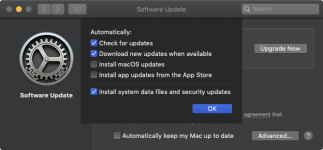Yeah, Intel Macs added the ability to easily boot off of USB. SD cards are so cheap and good now, I also for a while kept a 32-gig utility SD card around for my Mac mini.
I also had a 750-gig USB external disk that booted the then-current OS X release with a bunch of other OS X installers and some OS X utility software and app installers on it, and lent that disk to friends on a handful of occasions for recovery/rebuild purposes.
THIS is why I don't like SaaS.
The interesting thing here is, Adobe pretty much stands out in actually doing all the things everyone spent all their time predicting Microsoft would be doing, when Office 365 was announced in June 2011, a couple months ahead of the announcement of Creative Cloud, in October 2011.
And yet, as far as I can tell, Microsoft's behavior on this front is largely exemplary, or at the very least, a lot less abusive than Adobe's. For example:
- No price increases
- Several different price tiers
Home/Multiuser, Personal/1user/machine, Student 1user/2computer/4year
[*]Increase of "Home" license from 5 to 6 machines
[*]Full terabyte of storage (Adobe increased to a terabyte only in the last year or so, it was 100gb for the longest time)
[*]Each member of "home" license gets their own full terabyte of storage
[*]Functional web-based apps for using the software elsewhere
[*]continues to sell perpetually licensed Office [year] products, up through Office 2019 Mac/PC.
[*](Mostly, except for Access) File formats haven't changed since 2007, meaning you can open your documents on older versions of Office
[*]Deactivated Office software opens files read-only to access information, you can install Office from the Internet and use it this way without signing in (I'm about 95% sure on this.)
[*]Adds new functionality on a regular basis, and as a whole the service does a lot of good to tie together bits of Microsoft's consumer ecosystem.
I'm fully aware that Microsoft
could do all this stuff, but, it's been several years and they still haven't. (There was that time they decided to just end quotas altogether, but the datahoarder people went utterly wild and so Microsoft had to reel that back a lot and so we'll see how long it takes to be able to buy more gigs on a single OneDrive account, which is admittedly the most annoying aspect of "you can get 6TB of storage with OneDrive!" - no, you can get six
users worth of storage on OneDrive, you don't really get to choose how it's allocated among those six.
Honestly, Office 365 is a
pretty good deal for the storage alone. It's priced comparably to what iCloud and Dropbox charge for that amount of storage, and those services don't
also give you Microsoft Office, or in the case of Dropbox, an ad-free inbox.
Ultimately, I suspect that the real way out of the future software vendors have arguably wanted since the 1980s where you rent your computer, is to exit the commercial software space entirely. There's nothing saying Apple won't start tying iWork functionality to an iCloud subscription or renting Final Cut Pro and Logic for $20 a month, and that Quark won't go back on everything it's doing to try to get people back to XPress, once it has enough users and feels like they're sufficiently locked in again.

